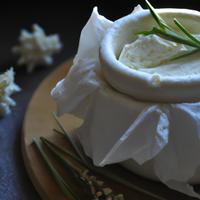
1 serving (50 grams) contains 87 calories, 3.0 grams of protein, 7.0 grams of fat, and 3.0 grams of carbohydrates.

Log this food in SnapCalorie

Nutrition Information
Calories |
414.3 | ||
|---|---|---|---|
% Daily Value* |
|||
| Total Fat | 33.3 g | 42% | |
| Saturated Fat | 4.8 g | 24% | |
| Polyunsaturated Fat | 0 g | ||
| Cholesterol | 0 mg | 0% | |
| Sodium | 476.2 mg | 20% | |
| Total Carbohydrates | 14.3 g | 5% | |
| Dietary Fiber | 4.8 g | 17% | |
| Sugars | 2.4 g | ||
| protein | 14.3 g | 28% | |
| Vitamin D | 0 mcg | 0% | |
| Calcium | 119.0 mg | 9% | |
| Iron | 3.6 mg | 20% | |
| Potassium | 357.1 mg | 7% | |
* Percent Daily Values are based on a 2,000 calorie diet. Your daily values may be higher or lower depending on your calorie needs.
Food Attributes
Source of Calories
About Vegan ricotta
Vegan ricotta is a dairy-free alternative to traditional ricotta cheese, crafted using plant-based ingredients like cashews, almonds, tofu, or coconut milk. This creamy and versatile staple is inspired by the Italian cuisine it originates from, making it perfect for lasagna, stuffed shells, pizza, or as a dip. Rich in protein, fiber, and healthy fats depending on its base ingredient, vegan ricotta is a nutritious choice for those seeking to limit saturated fat and cholesterol found in dairy products. Additionally, it’s often fortified with vitamins like B12, adding further nutritional value for vegans and vegetarians. However, some versions may contain higher salt levels or refined oils, so it’s essential to check labels for balanced options. Whether used in savory dishes or dessert recipes, vegan ricotta provides the perfect plant-based touch for health-conscious and environmentally mindful individuals.



